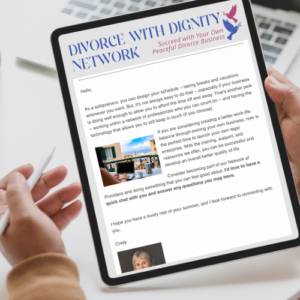How Family Law Professionals Are Leading with Empathy, and What That Means for the Future of Divorce
🔹 Summary:
In 2025, the most progressive divorce professionals are no longer focused solely on the legal aspects of separation—they’re addressing the emotional and psychological toll too.
Today’s clients are overwhelmed, often grieving, and need more than a legal outcome. Forward-thinking family law attorneys and mediators are partnering with therapists, offering stress management resources, and guiding clients with compassion—not just contracts.
This isn’t about going soft—it’s about getting smart. Because when clients feel emotionally supported, outcomes are smoother, conflict is reduced, and long-term compliance is higher.
Divorce With Dignity Providers are already leading the way in this client-centered shift—delivering legally sound outcomes while creating space for emotional clarity and practical peace.
The Shift: Why Emotional Support in Divorce Is No Longer Optional
For decades, divorce law has emphasized what gets divided—assets, debts, time with children—but rarely addressed how people are emotionally navigating the split.
But in the wake of global uncertainty, shifting family structures, and growing mental health awareness, a transformation is happening:
💡 Divorce professionals are recognizing that supporting the emotional journey is essential—not extra.
Clients today are asking deeper questions:
-
How do I co-parent without resentment?
-
How do I rebuild my identity after a 20-year marriage?
-
How can we separate without destroying our kids in the process?
These are not just personal concerns—they directly affect how the divorce unfolds, and how sustainable the final agreements will be.
The Problem with the Traditional Model
In many traditional law firm settings, the emotional needs of the client are either seen as irrelevant or inconvenient. Legal professionals are trained to stay in their lane—focused on statutes, outcomes, and court strategy.
But this approach often:
-
Escalates conflict (unprocessed emotions spill into litigation)
-
Increases costs (more time in court, longer negotiations)
-
Decreases client satisfaction (people may win legally but feel worse personally)
Attorneys, mediators, and paralegals often find themselves fielding emotional reactions anyway—without tools or frameworks to support clients effectively.
What Innovative Professionals Are Doing Differently
Forward-thinking practitioners are responding with empathy-informed legal services. They’re not becoming therapists—but they are building trauma-informed practices that acknowledge the human side of divorce.
Here’s how:
1. Integrating Mental Health Referrals
Attorneys and mediators are building referral partnerships with:
-
Divorce therapists
-
Trauma-informed counselors
-
Child specialists
-
Grief and transition coaches
This makes it easier to say: “This part of your experience is really important—and there’s someone who can help.”
2. Offering or Referring to Support Groups
Professionals are recognizing the value of peer connection—especially when clients feel isolated.
Some divorce service providers offer:
-
Access to trusted local or virtual divorce support groups
-
Groups specifically for parents, high-conflict exes, or older adults navigating gray divorce
3. Incorporating Emotional Check-Ins During the Process
Some professionals are adopting structured check-ins at major touchpoints:
-
Before finalizing agreements
-
During parenting plan development
-
After high-emotion mediation sessions
These moments build trust and reduce reactivity—clients feel seen, not just processed.
4. Offering Practical Stress-Reduction Tools
Some divorce professionals now share curated resources like:
-
Guided meditations for high-conflict moments
-
Self-regulation techniques before mediation
-
Journaling prompts to clarify goals and boundaries
This isn’t fluff—it helps clients show up with more clarity and less chaos.
The Professional Payoff: Why Emotional Support Is Good Business
This emotionally supportive model isn’t just good for clients—it’s good for business.
Legal professionals who build this into their practice often report:
-
Fewer escalations during negotiations
-
Faster resolution timelines
-
Higher client satisfaction and referrals
-
Reduced burnout—because the process is more human-centered for the provider, too
In short: compassion doesn’t slow you down. It creates efficiency through trust.
Why This Matters for Legal and Mediation Professionals
If you’re a divorce professional who’s already operating with empathy—or you want to build a more client-centered approach—this shift is your moment.
Clients are actively seeking professionals who can:
-
Help them stay out of court
-
Honor the emotional reality of their situation
-
Guide them through decisions that feel aligned—not just compliant
But too often, even the most compassionate attorneys and mediators are stuck in firm cultures or systems that don’t support this more progressive approach.
That’s where networks like Divorce With Dignity come in.
A Model That Honors the Whole Person
Divorce With Dignity Providers are part of a nationwide network offering:
-
Amicable, out-of-court divorce solutions
-
Compassionate support rooted in professional standards
-
Room to bring in vetted therapists, counselors, financial planners, and child experts
-
Legal clarity and emotional intelligence
As a Provider, you stay in your professional lane—while being part of a broader ecosystem that honors the full divorce experience.
Whether you’re an attorney, mediator, or legal document professional, this approach:
-
Meets today’s market demand
-
Reduces conflict and chaos
-
Leaves families (and professionals) healthier on the other side
Final Thoughts: Compassionate Divorce is the Future—And Divorce With Dignity Providers Are Already There
At Divorce With Dignity, we believe that people navigating divorce deserve more than paperwork and courtroom dates. They deserve a process that honors their humanity—where legal, emotional, and practical needs are addressed together, not in isolation.
That’s why our Providers take a holistic approach to divorce. They don’t just guide clients through forms or procedures—they walk with them through one of life’s most difficult transitions, offering structure, clarity, and emotional steadiness. They create safe space for hard conversations, and help people make thoughtful decisions that hold up—not just legally, but in real life.
This approach isn’t just kinder.
It’s more effective.
Clients who feel emotionally supported are more likely to:
-
Reach agreements faster
-
Stay out of court
-
Co-parent with less conflict
-
And recommend their provider to others
That’s the power of integrating emotional intelligence into divorce services—and it’s what sets our network apart.
But we don’t just encourage this approach—we equip you to offer it successfully.
As a Divorce With Dignity Provider, you get access to:
-
A respected national brand focused on peaceful, client-centered divorce
-
Business and marketing support to help you reach ideal clients
-
A model that allows flexibility, autonomy, and alignment with your values
-
A network of like-minded professionals and vetted referral partners—from therapists to QDRO experts—who help you serve the whole client, not just the case
Whether you’re an attorney ready to move beyond high-conflict litigation, a mediator expanding your reach, or a legal professional who knows there’s a better way—this is your invitation to join the movement.
The legal landscape is changing. Clients are looking for clarity and compassion.
They’re seeking professionals who understand that peaceful doesn’t mean passive—and that structure can coexist with empathy.
If that sounds like the kind of work you want to be doing, you’re in the right place.
📍Learn more about becoming a Divorce With Dignity Provider at peacefuldivorcebusiness.com
Let’s build a more dignified future—together.





